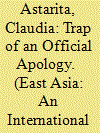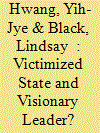|
|
|
Sort Order |
|
|
|
Items / Page
|
|
|
|
|
|
|
| Srl | Item |
| 1 |
ID:
171795


|
|
|
|
|
| Summary/Abstract |
This work proposes a theory of ‘celebritisation of politics’. It assumes that celebritisation of politics takes shape once politics and political affairs are celebritised. It argues that in democratic countries, not merely individual celebrity turns into politician (celebrification of celebrity-politician), but also individual politician transmutes into celebrity (celebrification of celebrity-politician). The degree to which these celebrifications take place is likely determined by the country-, the media-, celebrity- and audiences-related factors. The first includes political party, government, media and election systems. The second incorporates mediatisation, representation and commodification of celebrity politician by the media and political economic structures of the media and cultural industries. The third consist of diversification and migration of celebrity politician and his/her personal and professional backgrounds. The fourth is connected with characteristics of the audiences addressed by the media and cultural industries, celebrity politician and political actor and organisation s/he associated with. Focusing on Indonesia’s democracy, this work reveals that establishments of the democratic political, media and election systems lead to celebrification of celebrity-politicians taking place in this country. In facing the parliamentary and local government elections, political parties recruited and commoditised substantial number of celebrities as candidates and represented them as political leaders to captivate the electorates and seek either parliamentary or local government offices. Some of them succeeded in such elections. They were migrating not merely across political parties, but also across the election arenas. Total number of those who turned into celebrity-politicians increased substantially, but none of them successfully came up as prominent politicians.
|
|
|
|
|
|
|
|
|
|
|
|
|
|
|
|
| 2 |
ID:
171794


|
|
|
|
|
| Summary/Abstract |
Radical political activities can harm social stability and economic performance. With a three-wave dataset for a sample of young people in Hong Kong, this study evaluated a cross-lagged model to evaluate the development of radical political participation. The results showed that social media use significantly increased the online political communication of the young people and that this significantly promoted their radical political participation. This was mediated by a significant increase in the heterogeneity of their social media network. These findings contribute to the further development of communication mediation theory in the field of political behaviors. They provide an in-depth understanding of the development of radical political behavior among young people and offer practical suggestions for policy makers and educators who are striving to reduce mass radical political engagement.
|
|
|
|
|
|
|
|
|
|
|
|
|
|
|
|
| 3 |
ID:
171793


|
|
|
|
|
| Summary/Abstract |
More than 70 years after the end of the Second World War, warring nations have not completely achieved true reconciliation. For decades, official state-sanctioned apologies have been considered a useful tool to help rebuild broken international bonds, but their effectiveness in fostering national reconciliation remains debatable. On the contrary, more and more studies seem confirming civil society’s role in facilitating people’s reflection upon the most rending aspects of their own past. With civil society involvement in the discussion of Second World War responsibilities still limited in Japan, this paper recalls the experiences of Germany and Italy and the difficulties they encountered in shaping a constructive discussion on war responsibilities and reconciliation to argue that the Obama-Abe exchange of official visits in Hiroshima and Pearl Harbour in 2016 represents a crucial step forward in relaunching the debate on the Japanese Second World War narrative. In particular, this article claims that the wording and the images used by Shinzo Abe and Barack Obama could become, if well framed by national media and the official debate, “agitators of memory” pushing civil society to further and more deeply engage in this crucial discussion for the future of Japan.
|
|
|
|
|
|
|
|
|
|
|
|
|
|
|
|
| 4 |
ID:
171792


|
|
|
|
|
| Summary/Abstract |
Over the past decades, numerous critiques have emerged of China’s policy towards Africa. These critiques perceive China as a mercantilist or neocolonial power seeking to dominate the African continent through land grabs, exploitative trade deals, and resource extraction. These critiques do however not consider how the Chinese government has attempted to justify its aid policy towards Africa in ways that claim to secure human beings. Though the Chinese government has not officially adopted the concept of human security, it has engaged with the concept and developed its own interpretation of how human beings should be secured. This interpretation is based on the depiction of China as a state victimized through imperialism that has emerged in the twenty-first century as a global power with visionary ideas. Accordingly, Chinese policymakers believe they can offer an alternative model to Western interventions, imposition of neoliberal economic doctrine, and emphasis on democratization and human rights. In Africa, though China’s vision has generated benefits for some, it has also victimized others. China needs to critically reflect on and adapt its developmental vision if it truly intends to help human beings overcome the myriad challenges they face in their daily lives.
|
|
|
|
|
|
|
|
|
|
|
|
|
|
|
|
|
|
|
|
|